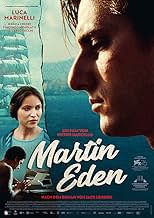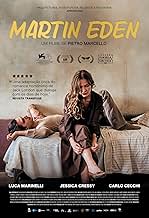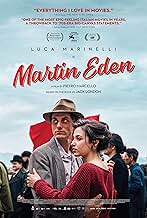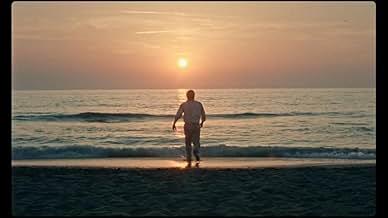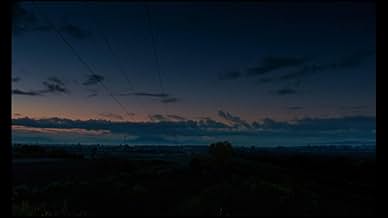Martin Eden si sforza di superare la sua situazione di miseria e proletariata in un'intensa e appassionata ricerca di autoapprendimento, sperando di trovare un posto nell'élite letteraria.Martin Eden si sforza di superare la sua situazione di miseria e proletariata in un'intensa e appassionata ricerca di autoapprendimento, sperando di trovare un posto nell'élite letteraria.Martin Eden si sforza di superare la sua situazione di miseria e proletariata in un'intensa e appassionata ricerca di autoapprendimento, sperando di trovare un posto nell'élite letteraria.
- Regia
- Sceneggiatura
- Star
- Premi
- 11 vittorie e 53 candidature totali
Recensioni in evidenza
Cons: Everything goes well, until halfway the film gets to the essence of things. That is when the contradiction starts, disappointing superficial (childish) arguments empty of essence, and the poor viewer who identified with the main character, feels betrayed up until the pointless unoriginal ending of the movie.
In short, it's a self-contradicting film based on the flawed approach of the original author of the novel (Jack London) who even admitted "I must have bungled it", and was made worse by the filmmaker. The writers (the director Pietro Marcello along with Maurizio Braucci ) even added a known politically misleading cliche-phrase as-a-fact, -that doesn't exist on the book, and is worth mentioning here since the movie has a pseudo-political narrative: "Philosophy was born because the Ancient Greeks were able to avoid physical labor thanks to their slaves who allowed them to devote themselves exclusively to thought."
-Why then philosophy wasn't born somewhere else, where slavery was flourishing in the whole known world for centuries? -Why philosophy that set man on its center for the first time in history, was born after democracy was invented and established for the first (and only) time and shifted all power to the people? -Why philosophy was born on a state that gave the slaves more privileges than the privileges of the citizens of the rest of the world, and conversion of a citizen to slave was prohibited by law (and all slaves were foreigners brought from abroad and had equal rights with every citizen except voting)? So, was philosophy born due to the slaves in Ancient Athens, or due to the fact that democracy freed thought for the first time, logic and rhetoric was born, schools of thought, that attracted all wise men from around the world to see, learn and contribute to the "miracle"?
So, please try not to parrot false, misleading cliche, especially the ones about history, it's neither good for you, or your viewers.
Lo sapevi?
- QuizShot on Super 16mm.
- Citazioni
Martin Eden: So the world is stronger than me. Against its power I have nothing but myself, which, in any case, is quite something. For as long as I don't let myself get overwhelmed, I am also a force. And my force is fearsome as long as I have the power of my words to counter that of the world. Those who build prisons don't express themselves as well as those who build freedom.
- ConnessioniEdited from Il passaggio della linea (2007)
I più visti
- How long is Martin Eden?Powered by Alexa
Dettagli
- Data di uscita
- Paesi di origine
- Siti ufficiali
- Lingue
- Celebre anche come
- Martín Eden
- Luoghi delle riprese
- La Balzana, Santa Maria La Fossa, Campania, Italia(Martin living in countryside)
- Aziende produttrici
- Vedi altri crediti dell’azienda su IMDbPro
Botteghino
- Budget
- 4.400.000 € (previsto)
- Lordo in tutto il mondo
- 3.132.976 USD
- Tempo di esecuzione
- 2h 9min(129 min)
- Colore
- Proporzioni
- 1.66 : 1

![Guarda Trailer [OV]](https://m.media-amazon.com/images/M/MV5BNDBhMzE5MWItYTQyYy00YTAyLWFkYWQtNTE2N2YxYmE5ZTcyXkEyXkFqcGdeQXRyYW5zY29kZS13b3JrZmxvdw@@._V1_QL75_UX500_CR0)

